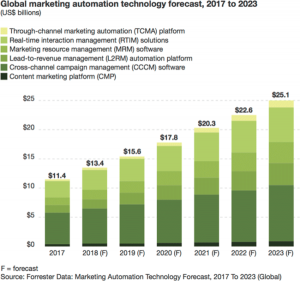Edward Jones, Morgan Stanley Demonstrate Unique Organic, Paid-Search Strategies
by Laurie Sullivan @lauriesullivan, June 22, 2017
Search engine marketing and advertising strategies also appeal to firms that manage consumer wealth such as Edward Jones, Morgan Stanley, and Chase. Just ask the folks at Edward Jones, which ranked top among wealth management brands in organic listings and local search categories, according to a recent study.
Edward Jones took nearly 40% of the total click share across more than 7,000 locations for the local search category, which means that in some of the 5,000 sample cities, it dominated the page with more than one location appearing in search engine query results, according to recent findings from Hearsay and Moz.
In fact, Edward Jones had more than 4,000 local landing pages that served up in results, which also enabled the company to take the lead for organic click share.
The Hearsay and Moz research highlights the top-ranking wealth management firms when it comes to SEO, local and paid search, but the most interesting data point reveals each category frontrunner taking a huge lead. The findings demonstrate that these top brands use a strategy consisting of all three to attract customers online.
Investing in a Web site alone is not enough. Many brands hope to gain share of attention by creating custom experiences, but the data shows that breadth is important. Along with targeted keyword phrases, having Web sites for every adviser and potentially city-based landing pages are also important.
While Morgan Stanley only served up 125 landing pages in the organic strategy, the company made up for its organic lag with a strong presence in paid-search advertising. In the No. 1 spot for paid-search advertising, Morgan Stanley captured nearly 20% of click share. Other wealth management firms such as UBS and Chase also had a presence, but not as strong.
Given the competitive space in paid search with relatively high costs-per-click (CPC), Morgan Stanley had only 366 domains appearing in paid listings in the Hearsay and Moz joint study. This was not due to a lack of ads, according to the study. More than 99% of the search results examined displayed ads, and nearly every search served seven ads.
In the analysis, the paid strategies focused on a few landing pages. Morgan Stanley only had five URLs across 5,000 cities, in contrast to the approach used to rank well in organic and local search, per the study.
The analysis suggest that this is because these ads are being managed by a corporate advertising team or agency, rather than through local marketing or distribution and sales efforts.
The findings also suggest there is an opportunity to further optimize conversion and reduce costs by using locally targeted landing pages as part of a paid-search strategy and the firms that can implement this first will gain an advantage.
The study, conducted in April 2017, analyzed five popular key phrases: “financial advisor,” “financial planning,” “financial planner,” “financial consultant,” and “wealth manager.” For each keyword phrase, company analysts looked at the first page of Google search results across the largest 5,000 cities in 48 states.
The data resulted in identifying URLs and ranking positions across organic, local and paid results.
MediaPost.com: Search Marketing Daily
(70)
Report Post



